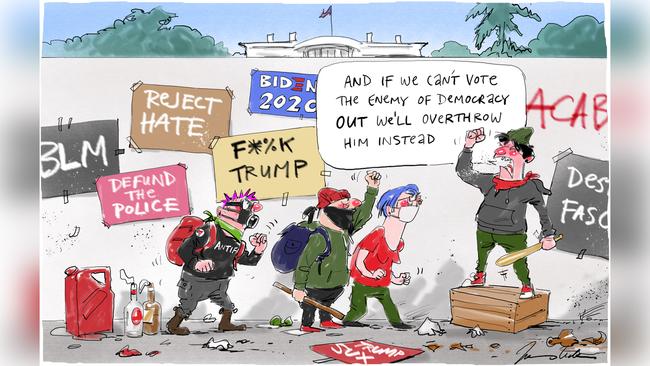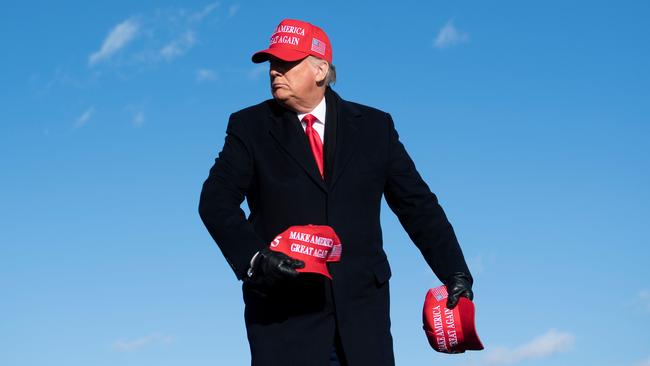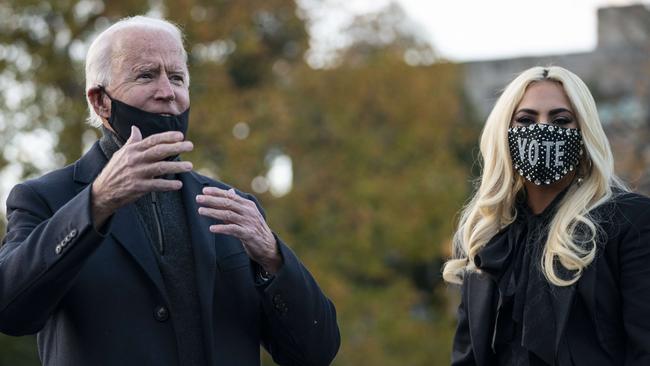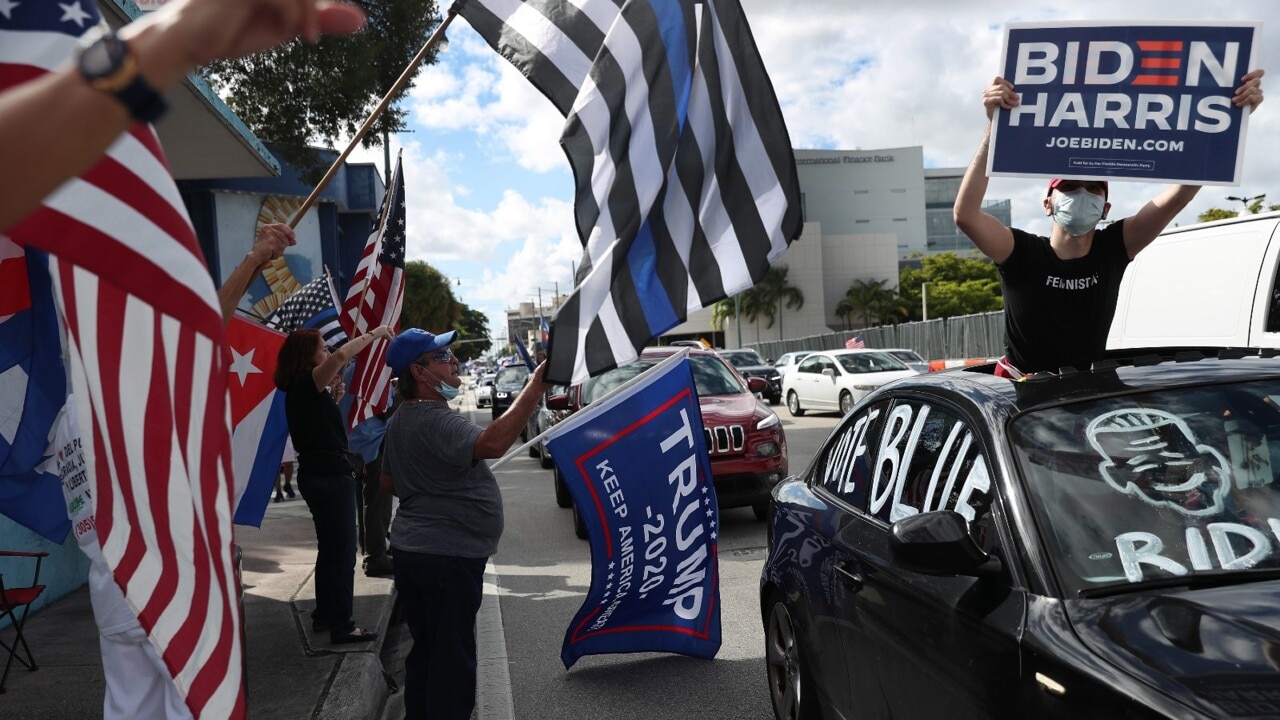
The two great political traditions in America — liberalism and conservatism — are being trashed in a struggle of mutual hate and debasement.
The ultimate question, accentuated by Donald Trump’s compulsion to divide, is whether progressive liberalism and cultural conservatism can live together short of violence and civil disorder.
Will the democratic process — election 2020 — be the stabilising or unravelling of America?

Will this election make things better or worse? Will the election bequeath renewal or retaliation? It is staggering to think that just 30 years after the triumph of American democracy — the triumph of classic liberalism against Soviet communism — that America’s own system of liberalism is under threat from within. Trump and Joe Biden along with politicians and commentators from both sides proclaim this is America’s most important election for decades — perhaps ever. But what does this mean? What is the real issue? Is it one side crushing its enemies on the other, or is it a pathway to repair a broken nation?
Victory without reconciliation is no meaningful victory at all.

Political conflict never occurs in a vacuum. In his brilliant October essay in Atlantic magazine, David Brooks argues that America is undergoing a moral convulsion: “People feel disgusted by the state of society. Trust in institutions plummets. Moral indignation is widespread. Contempt for established power is intense. The events of 2020 — the coronavirus pandemic; the killing of George Floyd; militias, social-media mobs and urban unrest — were like hurricanes that hit in the middle of that earthquake. They did not cause the moral convulsion but they accentuated every trend.”
The moral convulsion reflects a deeper phenomenon. The brilliant 20th-century American model of economic and social life has failed to make a successful transition into the 21st century. American adaptability and reinvention has lost its genius — at least for the time being. Its 20th-century strengths reappear as 21st-century weaknesses.
Last century, the US thrived on First World innovation and Third World costs, prosperity in globalisation, market capitalism cushioning a weak social safety net, individual aspiration disguising entrenched injustice, tolerable family stability and passionate patriotism operating as the glue of national unity — but the new century puts this model under breaking pressure at every point.
The big-tech digital economic age turbocharges individual narcissism, wealth inequality, low wages, poor productivity and personal insecurity while ruining the social compact, the shared values of the industrial age and undermining the once universal culture, no longer able to contain the centrifugal forces blasting through all institutions and fomenting a new tribalism.
“Renewal is hard to imagine,” Brooks says. “Destruction is everywhere and construction difficult to see. The problem goes beyond Donald Trump. The stench of national decline is in the air. A political, social and moral order is dissolving. America will only remain whole if we can build a new order in its place.”
Can Trump or Biden build that order?
No insight is needed for the judgment on Trump. His politics is based on domestic political warfare. Trump cannot run a coherent executive government, cannot respect his own officials, has no loyalty beyond his family, has debased every conservative virtue from decency to sacrifice to honesty, lives off the exploitation of grievance and anger, casts doubt on whether he will accept an election defeat and has turned executive power into a capricious project of short-term personal interest.

But Trump can campaign. He is a campaigner, not a governor. He thrives on disruption in an age of rule-breaking. He is a celebrity in an age of entertainment. His final days of barnstorming seek to mobilise his base for more change, more disruption and more rejection of the decaying old liberal order. Trump comes not to reconcile the nation but to further drive the Trumpian rebellion.
Biden, by contrast, promises hope and healing — yet the foundation of his campaign is a referendum on Trump. Biden is the anti-Trump. He seeks a majority mobilised on a repudiation of Trump’s character and his ineptitude against COVID-19. Biden brands Trump a racist, a liar, a tax cheat, a threat to democracy and a president responsible for thousands of American deaths in the pandemic.
Yet Biden remains a weak, ageing and unconvincing candidate, running a small-target strategy, presenting as a centrist trying to conceal the decisive shift of the Democratic Party to the left and its embrace of identity politics, income redistribution and radical climate change action.
Much of the Democratic Party and almost the entire progressive movement has never accepted the legitimacy of Trump’s 2016 victory, setting up a dangerous set of expectations.
So Biden seeks Trump’s defeat as a moral imperative for America — and Trump seeks Biden’s defeat to vindicate the Trumpian revolution. If Biden loses — even if winning the popular vote — the anger among Democrats will be searing white-hot, the progressive movement will double down against Trump and the party will swing further to the left.
If Trump loses, particularly in a close contest, claims of fraud, robbery and non-acceptance will be rife and his populist movement will stay in the field.
The best result is a Biden victory comfortable enough not to be credibly contested. It is hard, however, to foresee a good outcome; that is, an outcome that breaks the cycle of self-perpetuating polarisation and division.
That judgment might underestimate the recuperative power of US democracy — the election turnout will be huge, the people are engaged, the sense of citizens shaping their nation’s future in that noble American voting enterprise may constitute a circuit-breaker. Maybe.
The trouble is that the beating heart of both movements — the progressive left and the populist right — correctly sees the status quo as untenable, discredited and immoral but has utterly opposing visions that define the ideological chasm in America. It looms as unbridgeable at this time.
The US crisis of trust has two deadly linked dimensions: people have lost trust in institutions and the political system but, more significantly, they have lost trust in one another — and not just trust; they are beginning to see their political rivals as their enemy.
Brooks quotes sociologist Zygmunt Bauman to the effect that “all the traits that were once assigned to you by your community you must now determine on your own: your identity, your morality, your gender, your vocation, your purpose and the place of your belonging”.
If true, this is a dysfunctional society. A nation cannot work on that basis. America was born as a revolutionary country transfixed by its high ideals. Its perpetual dilemma is whether those ideals — impossible to always realise — are a source of renewal or licence to despair.
The collapse of the American code of traditional virtue along with the collapse of institutional authority that once propagated that code risks generating a society that cannot deliver for the common good.
American analysts have identified the malaise on all sides. The right has distrusted government and collective solutions for too long, clinging to a rigid libertarian individualism totally out of kilter with the needs of society post-pandemic and post-recession. The populist left is obsessed with harnessing people power on behalf of the environment, the needy and every minority cause, thereby inducing paralysis in the political system. And the elitist progressives who have real power in the institutions are pledged to imposing their cultural beliefs on their constituents with a fervour guaranteed to deepen the culture wars.
Australia is different to America, more different than many people once suspected. But we all have a stake in the American trauma.



The historical meaning of the US 2020 election is whether this democratic opportunity promotes national healing and rebuilding the political centre or is another staging post in the long road of failure — deepening America’s internal decline and the political civil war pulling the country apart.